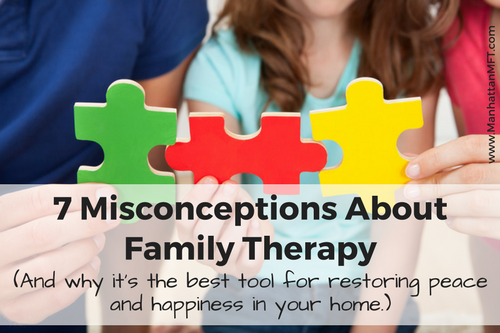Deciding to come to family therapy can carry a big emotional charge of perceived failure as a parent, child, or other family member. Or, because the nature of the quotidian subject matter is often perceived as just ‘life’, many families continue struggling, stuck in the same patterns that simply don’t work. These patterns of relating to, interacting with, and responding to other family members are complex and unique to each individual and family system. Because we affect others while others affect us, family therapy engages the entire family in the therapy process. Instead of singling out one family member as the problem person, it invites collaboration, an honest look at what everyone in the family is contributing to the situation, and what we can learn and do to change together. 7 Misconceptions About Family Therapy There are many misconceptions about and prejudices toward family therapy. Some of them are plain silly when analyzed closer, but none of them are a laughing matter since they keep many families in need of support away from healing and problem resolution. 1. I should be able to figure this out on my own. When we are struggling with family life, it seems that everyone has it ‘together’ but us. Of course, we are comparing others’ ‘outsides’ to our ‘insides’, but the feeling that we are failing at something that others are winning at can prompt many to dig their heels in deeper and try to figure out a solution on their own. This is wrong because the family dynamics are set and encouraged by generations-old patterns of relating and behaving that are difficult to see and nearly impossible to break on our own. Without outside help, we’ll just keep hitting the wall. 2. Family Therapy means that I’ve failed as mother/father/member of this family. Going to therapy means that you had the courage to confront the dysfunction and even more courage to ask for help. Everybody has family-related challenges. How we handle those challenges depends on the skills that were modeled to us AND other members of our family. Remember, you are playing on a team here, so the responsibility for the win or loss is shared by everyone. 3. Going to therapy means that the parents will be blamed for kids’ behaviors. Not true at all. Firstly, blame is not a part of therapy at all. Secondly, family therapy addresses the dynamic in the family social system, with every participant playing a role that encourages the dynamic. The focus of family therapy is to find collaborative solutions to the problems. 4. Going to therapy means that something’s really wrong with you: you are weak, crazy, or somehow defective. This one is just nonsense! It takes little effort, courage or intelligence to keep things rolling downhill. It takes courage and strength to face the problem, take on the responsibility for solving it, then show up and do the work. People who go to family therapy are strong, resilient, courageous, and responsible. 5. Therapy means going to sessions indefinitely, continuing to struggle with the same issues and never truly resolving the problem. This is least true of family therapy, which is often structured around resolving a specific problem or addressing an event. Family therapy can be short-term (up to 6 sessions) or longer terms (20 sessions), but there is normally a clear goal and a treatment plan designed specifically to address your family’s unique characteristics, strengths, and challenges. 6. Everybody has to participate in all sessions. Family therapy is flexible where some sessions will include all the family members while other sessions may include a portion of the family. The nice thing about this flexibility is that no matter who is in the room, the goals are the same and the process to achieve the goals is consistent. 7. I already know why he/she does X. But, perhaps the biggest misconception of all is when we think we know precisely what others are thinking and feeling, and why they are behaving a certain way. Without open and honest communication between all family members, this is simply false. Family Therapy creates a safe space to share what's not been said and discover things we didn't even know had to be said! Here is an example: The parents in a particular family feel disconnected, resentful, hurt, and angry in their marriage. In response they argue or avoid one another. The kids are picking up on it and in turn feel angry, sad, and worried about their parents getting divorced. They avoid being home, cut school or neglect schoolwork, check out with electronics, withdraw or act out to create a diversion from the parents’ arguments. They may use drugs or alcohol to escape the problem at home. It is easy to look at the kids’ behavior and focus on them as the problem, but in order to repair this family, everyone’s side must be heard and validated. What can Family Therapy do for us?
Family therapy is designed to heal a family system of this family 'cold' or 'flu'. The goals are to help the family:
Wondering if Family Therapy is right for your family? Try an initial session (or, ideally, 3 sessions) to experience the process. Then, evaluate if it’s working for you. 10/17/2019 09:19:56 am
I'm glad you talked about how going to family therapy doesn't mean I've failed as a parent and we go to learn new skills for dealing with different problems. I have two teenage boys and lately, they've been very defiant and they've been acting out. I've been struggling to keep them in line and a friend suggested we go to family therapy. I felt i was failing as a parent but after reading this I know its perfectly normal to go. 9/8/2022 01:32:25 am
You made a good point when you discussed that the goals are the same no matter who participates in a family therapy session. My friend wants to save her family from falling apart. I should advise her to seek guidance from a professor that specializes in family therapy research. Comments are closed.
|
Categories
All
Archives
March 2023
|
[email protected]




 RSS Feed
RSS Feed